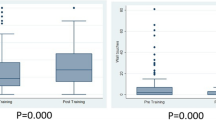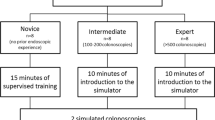Abstract
Background
The aim of this study was to analyze the learning curve for the GI Mentor II endoscope trainer and to determine whether psychomotor training can contribute to an improvement in the performance of virtual colonoscopy.
Methods
To analyze the learning curve, 28 subjects were divided into three groups on the basis of their experience with gastrointestinal (GI) endoscopy: experienced surgeons (group 1, performed > 200 endoscopic procedures, (n = 8)) residents (group 2, performed < 50 endoscopic procedures, (n = 10)); and medical students (group 3, never performed GI endoscopy, (n = 10)). The participants were tested on the GI Mentor II virtual reality simulator 10 consecutive times. Assessment of the learning curve was based on the following three parameters: time used, number of punctured balloons, and number of wall collisions. In the second part of the study, 20 subjects who had never performed GI endoscopy were included. After performing a virtual colonoscopy, they were randomized to a group that received psychomotor training and a control group. Finally, all subjects performed a virtual colonoscopy. Assessment of endoscopic skills during the colonoscopy was based on nine parameters dealing with psychomotor skills.
Results
The learning curve for time expended reached a plateau after the second repetition for group 1 (Friedman’s test, p < 0.05), after the fifth repetition for group 2 (p < 0.05), and after the seventh repetition for group 3 (p < 0.05). Experienced surgeons did not improve their scores for regarding number of balloons punctured or number of wall collisions (p > 0.05), indicating the absence of a learning curve for these parameters. Group 2 improved their scores up to the fourth and fifth repetitions, respectively (p < 0.05), and group 3 up to the fifth and seventh repetitions, respectively (p < 0.05). Experienced surgeons achieved the best performance, followed by group 2 and then group 3. The surgeons who had received psychomotor training performed the second virtual colonoscopy significantly faster than the control group (Mann-Whitney test, p < 0.001) and made significantly greater improvement in all other parameters as well.
Conclusions
There were different learning curves for surgeons depending on their endoscopic background. The familiarization rate on the simulator was proportional to the endoscopic experience of the surgeons. Psychomotor training had a significant effect on the performance of a simulated colonoscopy.


Similar content being viewed by others
References
InstitutionalAuthorNameAmerican Board of Internal Medicine (1991) Guide to evaluation of residents in internal medicine, 1991–92 American Board of Internal Medicine Philadelphia
A Ferlitsch P Glauninger A Gupper M Schillinger et al. (2002) ArticleTitleEvaluation of a virtual endoscopy simulator for training in gastrointestinal endoscopy Endoscopy 34 698–702 Occurrence Handle10.1055/s-2002-33456 Occurrence Handle1:STN:280:DC%2BD38vjslaqtw%3D%3D Occurrence Handle12195326
Grantcharov TP, Adamsen S, Rosenberg J, Funch-Jensen P. (2003) Assessment of GI endoscopic skills on a VR simulator: validation of GI Mentor. Annual meeting of the Society of American Gastrointestinal Endoscopic Suregons (SAGES), Los Angeles, CA, USA, March 12–15
TP Grantcharov L Bardram P Funch-Jensen J Rosenberg (2003) ArticleTitleLearning curves and impact of previous operative experience on performance on a virtual reality simulator to test laparoscopic surgical skills The Am. J. Surg. 185 146–49 Occurrence Handle10.1016/S0002-9610(02)01213-8
R Hawes GA Lehman J Hast KW O’Connor et al. (1986) ArticleTitleTraining resident physicians in fiberoptic sigmoidoscopy: how many supervised examinations are required to achieve competence? Am J Med 80 465–470 Occurrence Handle10.1016/0002-9343(86)90721-7 Occurrence Handle1:STN:280:BimC2Mrot1w%3D Occurrence Handle3953621
Moorthy K, Munz Y, Chang A, Jiwanji M, Darzi A (2003) Establishing the reliability and validity of a virtual reality upper gastrointestinal simulator using a novel video-endoscopic assessment technique. Annual meeting of the Society of American Gastrointestinal Endoscopic Surgeons (SAGES), Los Angeles, CA, USA, March 12–15
Author information
Authors and Affiliations
Corresponding author
Rights and permissions
About this article
Cite this article
Eversbusch, A., Grantcharov, T. Learning curves and impact of psychomotor training on performance in simulated colonoscopy: a randomized trial using a virtual reality endoscopy trainer. Surg Endosc 18, 1514–1518 (2004). https://doi.org/10.1007/s00464-003-9264-9
Received:
Accepted:
Published:
Issue Date:
DOI: https://doi.org/10.1007/s00464-003-9264-9




